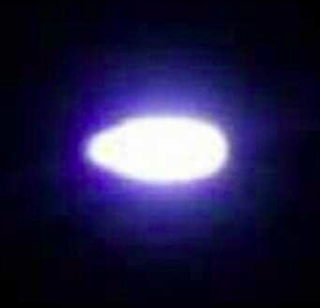I can’t say much about my experiences as an intelligence officer, but one thing I can say is that I constantly got the question from friends: “Are UFOs real?”
My answer was usually an enigmatic smile, which implied I knew more than I could say, but which really covered up total ignorance on the subject.
UFOs, ETs, alien abductions, and visitations were simply not subjects the Intelligence Community cared about, despite the public’s occasional obsession with the topic.
That’s why I was stunned when the Office of the Director of National Intelligence (where I was Director of Science and Technology) issued a report this June, Preliminary Assessment: Unidentified Aerial Phenomena (UAPs).
UAPs are the government’s name for UFOs: weird-shaped flying objects that move in shockingly abnormal ways.
The report focused on 144 sightings in the past 20 years, almost all by the US Military, 143 of which could not be explained. The majority of these sightings showed up on multiple sensors at the same time, such as special cameras and radars, and so could not be quickly dismissed as purely visual anomalies (birds, flying debris, balloons, ice crystals, atmospheric refraction).
In 18 cases, UAPs “appeared to remain stationary in winds aloft, move against the wind, maneuver abruptly, or move at considerable speed, without discernible means of propulsion.”
In one such sighting by multiple Naval aviators and radar operators in 2004 near San Diego, several objects appeared at 80,000 feet, then dropped within seconds to 20,000 feet without producing sonic booms, exhaust trails, or any other “normal” signature of rapid movement. Moreover, the objects had no wings, rotors, or engines, so they employed no known means of propulsion or aerodynamic lift.
Assuming that both UAPs and their shocking behaviors are real (it’s still possible mundane explanations might emerge), there are two possibilities regarding the science underlying the phenomena: The objects either represent exciting extensions of known science (such as directed energy physics) or exploit features of exotic unknown science (such as faster-than-light travel through gravitational worm holes).
Here, I’ll focus only on extrapolations of known science.
And the first branch of known science I’ll discuss is psychology, not physics or aeronautics, because part of our difficulty understanding UAP’s might have more to do with our own biases and expectations, than with the phenomena themselves. For instance, when we see “objects” darting around the sky, we naturally assume–falling victim to anthropomorphism— they are exotic versions of things we might build, such as manned or unmanned aircraft carrying their own means of propulsion. But what if UAP’s are unlike anything we might build, possessing no internal propulsion system of their own, but relying instead on external sources? Or, what if these UAPs aren’t manufactured objects at all, but a sort of mid-air projections that appear to be solid objects?
By putting aside our our biases to consider such ideas, but using known physics, we arrive at a set of very strange, but plausible explanations for UAP behavior that you likely haven’t heard of, even in science fiction movies.
These explanations, in one way or another, solve the mystery of astonishing accelerations and velocities by postulating that the UAPs have either minimal mass or zero mass.
This conclusion emerges from one of physics’s most fundamental equations A=F/M, where A is acceleration of an object, F is the force accelerating the object, and M is the mass of the object. Thus, at a given force, acceleration increases as mass decreases.
Given that some of the observed objects are as large as fighter jets weighing 20 tons or so, physicists at State University of New at Albany in 2019 calculated that 1100 Billion Watts of energy, more than 100 times that produced daily in the US, would be needed to move objects that heavy that fast.
Which quickly takes us into the realm of completely unknown physics, far beyond the scope of this article.
But suppose the objects are made of extremely lightweight, strong material that is pushed or pulled by directed energy, such as infrared (invisible) lasers or microwaves? Photons of light and microwaves do push and pull on matter, giving rise to one of NASA’s leading ideas for interstellar travel, light sails (light from the sun or a laser pushes on a large sail attached to a spacecraft, as shown below).
In this scenario, the hypothesized ultra-light objects themselves would have no internal propulsion whatsoever, but be pushed and pulled by lasers or microwaves emanating elsewhere (for example on a surface ship or orbiting satellite). Laser propulsion of projectiles has actually been demonstrated on a small scale, moving specially designed projectiles about 100 meters into the air.
This image of a “solar sail” from NASA in low earth orbit illustrates the concept of light (solar energy) pushing on lightweight, but solid objects.

Although scaling up the directed energy push/pull concept to account for UAPS’s is theoretically possible, it leaves unanswered the nagging question of why UAPS’s, traveling far faster than sound through the atmosphere, produce no sonic booms or other forms of turbulence.
One explanation is that the UAP’s have essentially no mass and thus no aerodynamic surfaces that would create sonic booms, because they are not manufactured physical objects, but an exotic (yet known) form of matter called free-air plasmas.
When intense laser or microwave radiation is focused in air, it strips electrons off of nitrogen molecules creating a plasma that emits light, heat and microwaves, and also reflects microwaves (so they might appear on infrared cameras and radars). Such plasmas can be oval, spherical or irregular in shape.
Below is plasma floating in air, produced by a high power laser beam. These plasmas don’t actually move, but appear to move when the massless laser beam forming them shifts around forming identical-looking plasmas in new locations. And a remote laser steering mirror could move the plasma locations far faster than you could move a laser dot from a laser pointer.

Even though US scientists don’t have directed energy systems capable of moving lightweight objects or forming plasmas that look and behave like reported UAP’s, someone else theoretically could have developed such technology, and might have deployed it for reasons we can only guess.
Maybe they want to see how we react to UAP’s, maybe they just want to mess with our heads, maybe (if the UAPs are plasmas) they are illuminating our military vehicles with electromagnetic energy to better sense and understand them.
We don’t know. But, given the Government thinks UAP’s are real, someone, somewhere appears to have science that is…out of this world.
